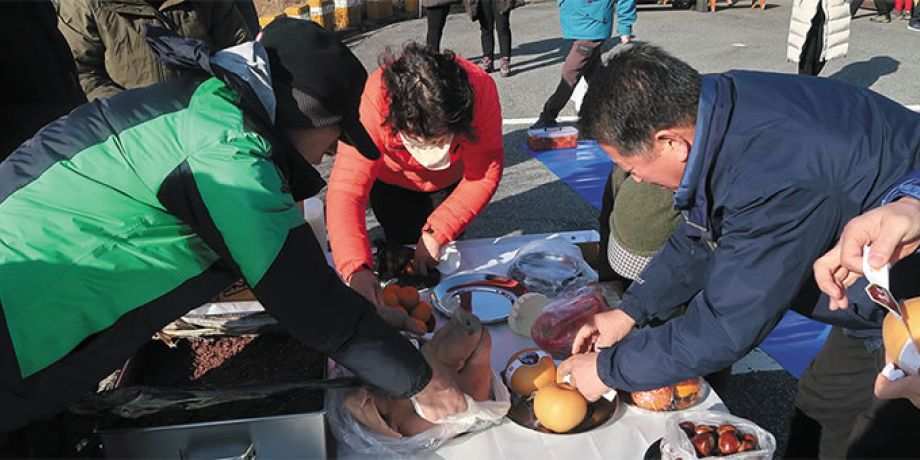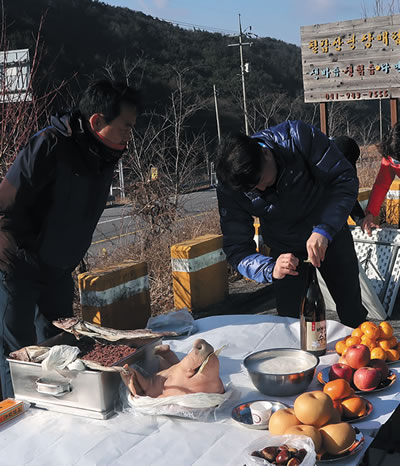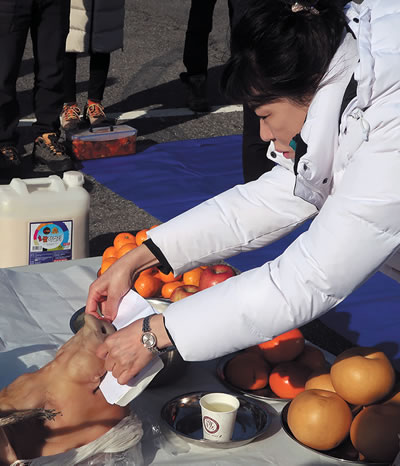
Some Things Never Change!
I visited Korea in February earlier this year after an absence of nineteen years. I'd been invited by old friends to return to this mysterious, yet very modern country, where I'd previously spent two years doing the Columban Overseas Training Program from 1980 to 1982 before being sent to Chile in 1985 after being ordained a priest. Even though I had visited Korea several times since finishing my time in training in 1982, I'd heard the country had become one of the most modernized and technologically advanced nations in the world. I wondered whether any of the more traditional Korea I had known as a seminarian, or Shin Hak Seng in Korean, still existed? I didn't have to wait long to find out!

The signs of modernity were everywhere, including the fast train that whisked me out of Seoul at 220 kilometers (136 miles) per hour to O Song. In O Song a family I knew from my time in training had organized to have me included on a bus trip planned by their local neighborhood committee to visit Chil Gak San National Park, then Taechon, in Cholla Pukdo. I was no sooner off the train than we set off on our trip. Word soon passed around there was a foreigner on the bus and that he was a Catholic priest. Of course, I was asked to stand up in the bus and give what is called a "Cho Un Mal Sum" in Korean which translates in English as a "good word." I stumbled through the insa which is the Korean word for greeting in English. After 37 years of not using the language, my Korean had grown quite rusty, but according to Korean custom, I had to greet the people and thank them for their hospitality regardless of how well or poorly I managed to express myself. I was quickly finding out that even though Korea had modernized very rapidly the old traditions hadn't disappeared completely, though some are in the process of doing so. More was to come!
We duly arrived at Chil Gak San, or Seven Peaks Mountain in English, and everyone disembarked from the bus. The sun was shining, but the weather was freezing, it being the middle of winter which is extremely cold in Korea. Soon a plastic mat was laid on the frosty, frigid ground of the car park and a low altar erected. Then with great fanfare a pig's head was pulled from a special bag and ceremoniously placed on a plate on the altar. All the Koreans regardless of religion, even the Christians along with the Buddhists and Shamanists except for myself, did a profound bow to the pig's head. White envelopes containing seemingly generous donations of money were stuffed into its mouth as offerings. In traditional Korean folklore, the pig represents wealth. The act of placing money in the pig's mouth is a plea from the people to the Spirit World for a continuance of financial security and prosperity. The fact that we had come to Chil Gak San was no accident either! Traditional Shamanistic thought teaches that good spirits abound in places of natural beauty such as Chil Gak San and to come into their presence in nature is to invite health and well-being. After the customary bows were completed, plates of dok, or Korean rice pudding, and copious bottles of Soju and Makholi, which are strong Korean alcoholic liquors, were generously shared among all present.

After an hour communing with nature we were soon on our way to Taechon where all the travelers on the bus planned to eat at a popular fish restaurant. However, all of a sudden the organizing committee hit a snag! When the neighborhood president looked at the pig's head, now returned to its ceremonial bag, the money he thought was in the pig's mouth had disappeared! There was great consternation! How were they going to pay for the planned lunch in Taechon? The trip's organizers were relying on the money that had been stuffed into the pig's mouth to pay the restaurant bill, and now it was gone!
As they carefully searched for the missing money trying not to alert the rest of the passengers to their plight, tensions silently mounted as the bus neared Taechon. The organizers were so desperate they began to silently wonder if the pig had mysteriously developed magical powers and snaffled the envelopes and the money? They were near despair as the restaurant loomed into sight.
Then all of a sudden one of the trips organizers stood up to get off the bus and a big wad of envelopes fell from his backside pocket. He'd put the envelopes into his back pocket after the ceremony finished but had forgotten all about it after drinking copious glasses of Soju, no doubt to keep warm in the intense cold of the Korean winter. Since everyone else had also imbibed generously, no one had noticed that he put the money in his back pocket. Everyone breathed a sigh of relief! As all the passengers piled off the bus heading for the restaurant the neighborhood president and his organizers thanked the pig for the sudden return of momentary prosperity shouting happily "Kenchanayo," It's all right! "O Jing Oh Ka mogo bopshida," Let's go and eat some raw squid!" It was then that I realized I was back in the Korea I knew of old. Some things just never change!
Columban Fr. George G. Hogarty lives and works in Chile.